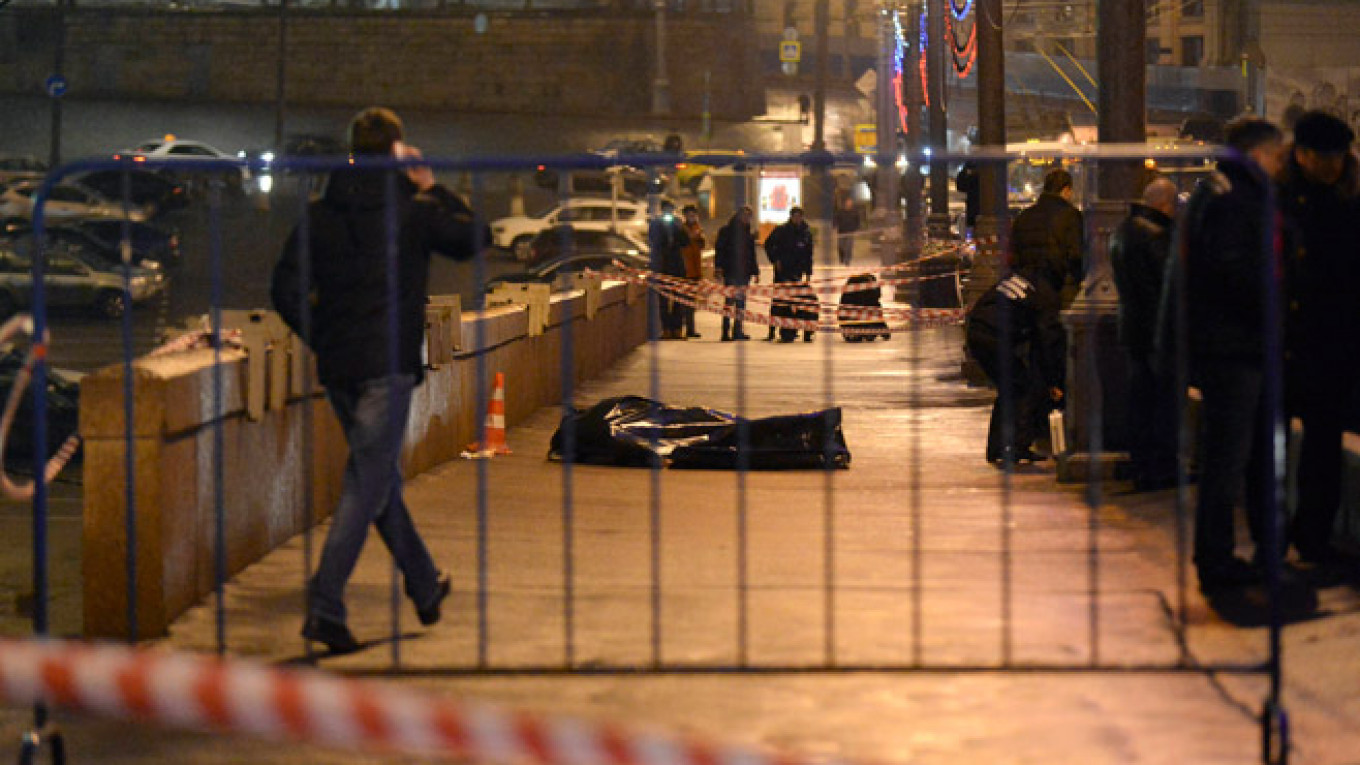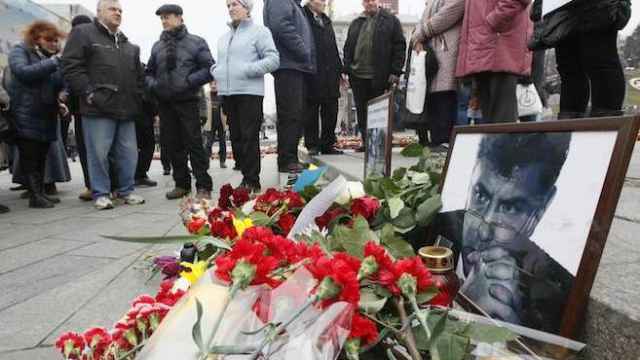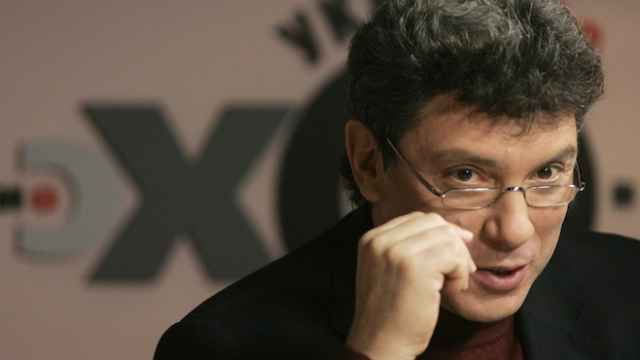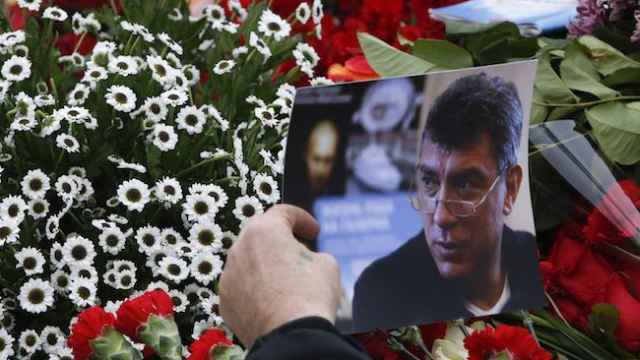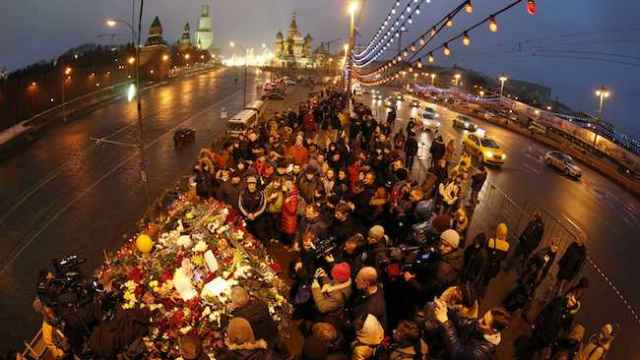It was near closing time on Friday at the upscale Bosco restaurant that looks out onto the illuminated red-brick walls of Moscow's Kremlin. Boris Nemtsov and his young, dark-haired girlfriend were finishing dinner.
A political reformer who had fallen foul of Russian President Vladimir Putin, Nemtsov had been preoccupied for weeks with details of an opposition march planned for Sunday.
Dinner at Bosco — dishes include beef with rocket salad and balsamic sauce or duck liver with wild berries — had been interrupted by telephone calls, a waiter told a Russian newspaper. Nemtsov also broke off for an interview with a Ukrainian radio station eager for the details of the rally.
Hopes were high that the demonstration, to condemn Putin's economic and foreign policies, would rekindle the flames of the street protests that in 2011-12 posed the first public challenge to Putin's more than decade-long rule.
The pair were among the last to pay their bill in the restaurant with its high airy ceilings and large windows. At around 11 p.m. Nemtsov, 55, a tall athletic figure with a mop of curly brown greying hair, escorted his girlfriend of some three years, Anna Duritskaya, more than 30 years younger, out onto Red Square.
Opposite them, across the cobbles stood the marble tomb that still bears the body of Bolshevik leader Vladimir Lenin, whose communist economic order Nemtsov helped dismantle after the 1991 collapse of the Soviet Union.
Nemtsov's apartment was a half-hour walk away at a leisurely pace. The couple turned left, passing to their right the candy-colored onion domes of St. Basil's Cathedral. Beyond that soared the Kremlin's Spassky Gate topped with a glowing crimson five-pointed star, another reminder of the Soviet past.
Further down the slope, they walked onto the Bolshoi Moskvoretsky Bridge; but Nemtsov never made it across.
Less than three hours later, policemen were washing his blood from the masonry and onto the banks of the Moscow River. He had been shot four times in the back and head in one of the worst shootings Moscow has seen in years.
Nemtsov had enemies politically and personally. Even among the opposition, his outsized character pulled some into his orbit and pushed others away, at times polarizing the fractious team of oppositionists.
For Nemtsov, the biggest opponent sat in the Kremlin.
Putin condemned the killing as a "provocation" and said he was placing the investigation under presidential control. In a telegram to Nemtsov's mother, he promised the killers would be found and punished.
Only hours before the attack, Nemtsov had given one of his last interviews, criticizing Putin, comparing his rule to the Nazi Third Reich and promising an uprising from the streets.
"We need to work as quickly as possible to show the Russians that there is an alternative, that Putin's policy leads to degradation and a suicide of the state. There is less and less time to wake up," Nemtsov told a correspondent for the Polish edition of Newsweek.
There was a time when Nemtsov's own sights were set on the country's top seat of power. Amid the chaos of the 1990s, president Boris Yeltsin had marked out Nemtsov, then a young, reform-minded deputy prime minister who had made fast friends with the country's richest and most powerful oligarchs.
Yeltsin had considered handing him the reins of power, but ultimately ceded the presidency to a little-known ex-KGB officer: Vladimir Putin.
Photographs from Nemtsov's political career as a deputy prime minister and opposition lawmaker show very formal interactions with Putin, the two shaking hands at a distance with fixed smiles.
But in recent years Nemtsov had become a greater thorn in Putin's side, compiling reports on sensitive topics — one that tried to expose the scale of corruption at the 2014 Sochi Winter Olympics.
Nemtsov's friends said his latest effort was to expose the presence of Russian troops in eastern Ukraine, where NATO, Kiev and Western governments say Russia has sent soldiers and weapons to support an armed uprising there.
Moscow has denied the accusations repeatedly.
"Boris Nemtsov received threats in the past, mostly anonymous ones. That was the nature of things," said Nemtsov's fellow opposition leader Ilya Yashin.
While Nemtsov received threats, law enforcement sources said he never went to the police to ask for protection. But as time passed, his worries grew. In an interview on Feb. 10 with lesser known Internet outlet Sobesednik, Nemtsov said that his mother had started to worry that Putin could have Nemtsov killed for his opposition politics.
The journalist asks, "After such conversations with your mother did you begin to worry that Putin could kill you either personally or through an intermediary?"
Nemtsov: "You know, yeah … a little. Not so much as mama, but still."
A Message from The Moscow Times:
Dear readers,
We are facing unprecedented challenges. Russia's Prosecutor General's Office has designated The Moscow Times as an "undesirable" organization, criminalizing our work and putting our staff at risk of prosecution. This follows our earlier unjust labeling as a "foreign agent."
These actions are direct attempts to silence independent journalism in Russia. The authorities claim our work "discredits the decisions of the Russian leadership." We see things differently: we strive to provide accurate, unbiased reporting on Russia.
We, the journalists of The Moscow Times, refuse to be silenced. But to continue our work, we need your help.
Your support, no matter how small, makes a world of difference. If you can, please support us monthly starting from just $2. It's quick to set up, and every contribution makes a significant impact.
By supporting The Moscow Times, you're defending open, independent journalism in the face of repression. Thank you for standing with us.
Remind me later.


